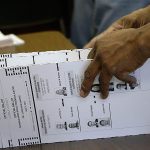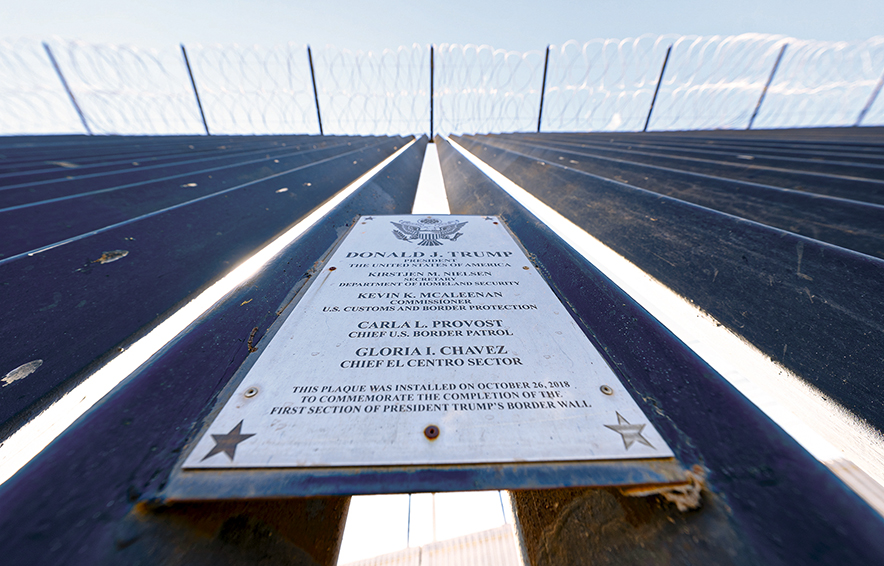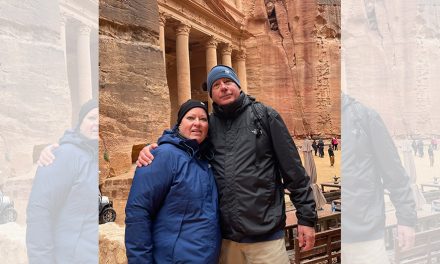
Concerns grow over ICE operation in Farmington

Special to the Times | Donovan Quintero
A plaque in Calexico, Calif., is hung on part of the fence where fencing was erected during President Donald Trump’s first term.
FARMINGTON
Federal immigration enforcement actions here have sparked fear and uncertainty among Navajo citizens, prompting a response from advocacy groups and state officials.
On Wednesday, Kay Rose, the executive assistant to the mayor of Farmington, confirmed that agents with the U.S. Immigration and Customs Enforcement were conducting operations within city limits. However, she declined to provide further details and referred inquiries to the Farmington Police Department. The department has not responded to a request for comment.
While no official details about arrests or detainments were made public, the ICE presence coincides with broader national enforcement measures initiated under Executive Order 14159, signed by President Donald J. Trump on Jan. 20. The “Protecting the American People Against Invasion” order revoked immigration policies established under the Biden Administration. It directed federal agencies to enforce immigration laws fully, establish Homeland Security Task Forces in every state, and expand detention capacity.
In the wake of these developments, Operation Rainbow Bridge, which supports displaced Navajo families, said it received multiple unverified reports that Navajo citizens were questioned or detained by ICE agents in urban areas in January. According to a statement posted to the ORB website, several individuals claimed their citizenship status was challenged during encounters with immigration officers. Although ORB emphasized that none of the reports could be independently verified, it urged individuals who may have been affected or witnessed enforcement activity to report it through its hotline at 855‑435‑7672, online form, or designated email.
Amid what ORB described as “rumors sweeping social media,” the organization issued travel guidance for Navajo citizens, especially those living or working off-reservation. ORB advised carrying valid, state-issued identification or a Navajo Nation Identification Card issued by the Office of Vital Records. It also recommended that individuals remain calm and comply if approached by law enforcement and that families prepare children to memorize essential personal information, including phone numbers and Social Security numbers. ORB stated that NNIDs are accepted instead of state IDs by federal immigration authorities, though demand has recently led to delays in issuing new cards.
New Mexico State Sen. Shannon Pinto, whose legislative district includes part of the Navajo Nation, said the situation has raised troubling concerns.
“It’s getting terrible out there,” she said in an interview. “They’re still not allowing people to have due process. They could say it’s over immigration, but you don’t know. You do one little thing, and they can turn it into crime.”
Pinto said she had not received any formal briefings from the state regarding coordination with the Department of Homeland Security or ICE operations in New Mexico despite the region’s diverse Indigenous and Hispanic populations.
“We briefed more over Covid than we have this,” Pinto said. “And I think this is starting to be just as bad.”
She described past incidents of wrongful deportation, including her uncle, who was mistakenly deported in the 1990s and later returned after family members provided documentation. However, she said recent actions feel different and appear to involve profiling.
“I haven’t had to produce my ID. We haven’t heard any reports from lighter people having an issue. So this is profiling, specifically in Hispanic areas, and our people fall into that category, as far as skin color,” she said.
Pinto advised Navajo citizens living off-reservation or traveling in urban border towns to carry Real ID-compliant identification and, if possible, a valid passport. She expressed deep concern about the lack of transparency and oversight in immigration enforcement procedures.
“If the processes were being followed, I think I would be OK,” she said. “But there’s no oversight. That’s problematic.”
Pinto said the growing unease has highlighted a deeper issue of safety and a sense of belonging.
“It’s unprecedented,” she said. “I hope that we unite to assure that our citizens can get back into feeling safe in the United States.”
The Navajo Times will continue to monitor developments and publish updates as more information becomes available.








 Highway 264,
Highway 264, I-40, WB @ Winslow
I-40, WB @ Winslow